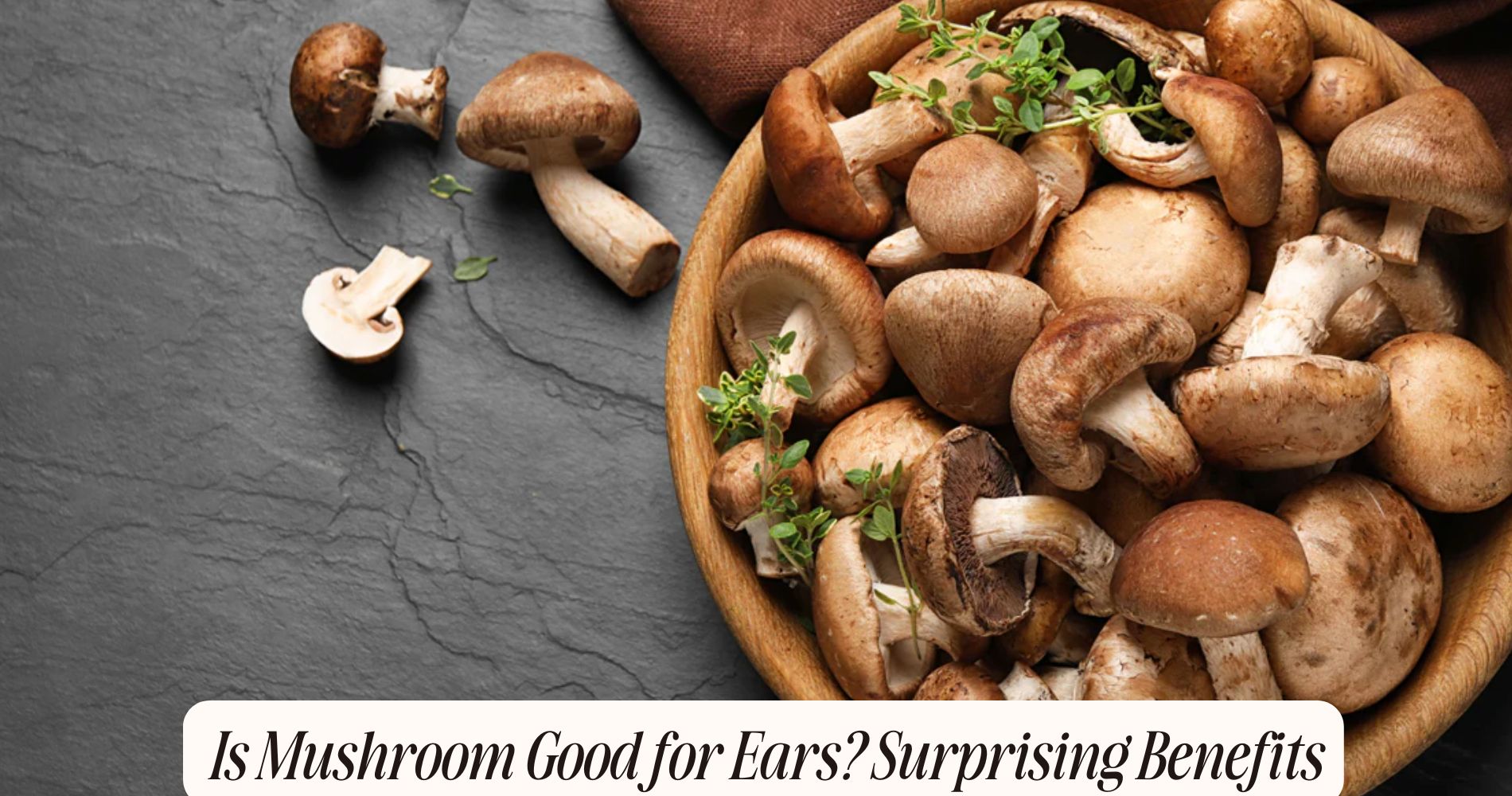Mushroom good for ears? Absolutely! Certain types of mushrooms, such as shiitake, reishi, and cordyceps, are packed with antioxidants and anti-inflammatory compounds that help protect ear health by reducing oxidative stress and inflammation. They also boost your immune system, defending against infections that could affect hearing. Rich in vitamin D, these mushrooms support the bone structures in your ears as well. Adding mushrooms to your meals is not only delicious but also a smart way to promote ear health naturally!

Is Mushroom Good for Ears? Surprising Benefits
Nutritional Profile of Mushrooms
Exploring the nutritional profile of mushrooms reveals a powerhouse of health benefits packed into these versatile fungi. You might be surprised to learn that different mushroom varieties, like shiitake, reishi, and portobello, each offer unique nutrients that can enhance your diet.
For instance, shiitake mushrooms are rich in B vitamins, which support energy metabolism and brain function, while reishi mushrooms are known for their adaptogenic properties, helping your body manage stress.

Mushrooms are low in calories but high in fiber, making them an excellent choice for maintaining a healthy weight. They also contain antioxidants, such as ergothioneine, which can help combat oxidative stress and inflammation in your body.
Additionally, mushrooms are one of the few non-animal sources of vitamin D, essential for bone health and immune function.
When you incorporate various mushroom varieties into your meals, you not only diversify your nutrient intake but also enjoy their umami flavor.
Whether you're sautéing them in a stir-fry or adding them to soups, these fungi truly pack a nutritious punch, contributing to your overall well-being. Embrace the health benefits of mushrooms for a more vibrant life!
Mushrooms and Immune Support
Mushrooms pack a nutrient-rich punch that can greatly boost your immune system.
Their anti-inflammatory properties not only help reduce inflammation in your body but also support overall health.
Including a variety of mushrooms in your diet could be a simple yet effective way to enhance your immune response.
Nutrient-Rich Mushrooms
A variety of nutrient-rich mushrooms can greatly bolster your immune system, making them a valuable addition to your diet. These fungi are packed with vitamins, minerals, and antioxidants that support overall health.
For instance, shiitake and maitake mushrooms are known for their immune-boosting properties, thanks to their high levels of beta-glucans. These compounds enhance your body's ability to fend off infections and illnesses.
Incorporating different mushroom varieties into your meals is both easy and delicious. You can sauté cremini mushrooms with garlic as a side dish or add portobello caps to your burgers for a hearty flavor. Their culinary uses are endless; toss them in soups, stir-fries, or salads to enjoy their rich taste while reaping health benefits.
Moreover, mushrooms like reishi and lion's mane have been linked to improved immune function. Consuming these varieties regularly can help you maintain a robust immune system, allowing you to stay healthy throughout the year.

Anti-Inflammatory Properties
Regularly incorporating mushrooms into your diet can greatly enhance your body's anti-inflammatory response. Certain mushroom varieties, like shiitake, reishi, and oyster mushrooms, are packed with bioactive compounds that can help reduce inflammation, including ear inflammation. Research shows that these mushrooms contain polysaccharides and triterpenoids, which support immune function and combat inflammation.
When you consume mushrooms, you're not just adding flavor to your meals; you're also providing your body with antioxidants that neutralize free radicals, preventing them from causing damage. This is particularly beneficial for conditions related to ear inflammation, as a healthy immune system can help ward off infections and other inflammatory responses.
Additionally, the ergothioneine found in mushrooms acts as a powerful antioxidant, further bolstering your defenses against inflammation. By including a variety of mushrooms in your diet, you can tap into their unique health benefits, promoting overall well-being and potentially alleviating discomfort associated with ear issues.
Anti-Inflammatory Properties
With their rich array of bioactive compounds, various mushroom species demonstrate impressive anti-inflammatory properties that can benefit ear health. You might be surprised to learn that mushroom extracts, such as those from reishi, lion's mane, and shiitake, have been studied for their ability to reduce ear inflammation.
These mushrooms contain polysaccharides and triterpenes, which can modulate the immune response and inhibit the production of inflammatory cytokines.
When you incorporate these mushroom extracts into your diet, you may experience a reduction in symptoms associated with ear inflammation, such as pain and discomfort. Research indicates that the anti-inflammatory effects can help alleviate conditions like otitis media, commonly known as middle ear infection.
Moreover, the bioactive compounds found in mushrooms may support overall ear health by promoting better circulation and reducing swelling.
Antioxidants and Ear Health
While addressing inflammation is essential for ear health, protecting your ears from oxidative stress is equally important. Oxidative stress occurs when there's an imbalance between free radicals and antioxidants in your body, and it can lead to cellular damage, including in your ears.
You mightn't realize it, but the delicate structures of your auditory system can suffer from this kind of damage, potentially impacting your hearing.
Antioxidant compounds play an important role in ear protection by neutralizing free radicals and reducing oxidative stress. Incorporating foods rich in these compounds into your diet can help support your ear health. Some of the most effective antioxidants include vitamins C and E, as well as flavonoids and polyphenols.
Mushrooms, in particular, are a fantastic source of these beneficial compounds. Varieties like shiitake and maitake contain high levels of antioxidants that can bolster your body's defenses against oxidative damage.

Specific Mushrooms Beneficial for Ears
Certain mushrooms consistently stand out for their potential benefits to ear health. When considering mushroom varieties that can help combat ear infections, two notable contenders are reishi and shiitake.
Reishi mushrooms are often praised for their anti-inflammatory properties, which can soothe ear inflammation and support overall immune function. This is particularly beneficial if you're prone to recurrent ear infections.
On the other hand, shiitake mushrooms contain polysaccharides that may enhance your immune response, helping your body fight off infections more effectively. Their rich nutritional profile, including vitamins B and D, also supports overall health, which indirectly benefits your ears.
Another mushroom variety worth mentioning is cordyceps. Known for its potential to improve oxygen flow in the body, cordyceps can help maintain healthy blood circulation, which is essential for ear health.
Incorporating these mushrooms into your diet—whether through supplements or culinary dishes—could be a tasty way to support your ear health.
As always, consult with a healthcare professional before making any significant dietary changes, especially if you're dealing with persistent ear issues.
How Mushrooms Improve Circulation
Mushrooms like cordyceps not only contribute to ear health but also play a significant role in improving overall circulation. Research shows that certain mushroom compounds can enhance blood flow, which is essential for delivering nutrients and oxygen throughout your body. When you consume these mushrooms, they work to dilate blood vessels, allowing for improved circulation.
Cordyceps, in particular, contains bioactive compounds that promote the production of adenosine triphosphate (ATP). This increase in ATP levels can lead to heightened energy and improved endurance, making it easier for your body to maintain peak blood flow during physical activities.
Additionally, mushrooms such as reishi and lion's mane also possess anti-inflammatory properties that can further support healthy circulation. By reducing inflammation in blood vessels, these mushrooms help to guarantee that blood flows freely, minimizing the risk of circulatory issues.
Incorporating these mushrooms into your diet can be a simple yet effective way to enhance your cardiovascular health. With improved blood flow, you may notice not just benefits for your ears but an overall boost in your well-being.
The Role of Vitamin D
Vitamin D plays an essential role in supporting ear health, as it helps regulate calcium levels and maintain bone density in the structures surrounding the ear. Adequate levels of Vitamin D are critical for ideal ear function, as it guarantees that the bones in the middle ear remain strong and properly aligned. This is particularly important because any disruption in bone health can affect sound transmission, potentially leading to hearing difficulties.
Research indicates that Vitamin D deficiency can result in various auditory issues, including increased susceptibility to infections and inflammation in the ear. When your body lacks this important nutrient, it can impair the immune response, making your ears more vulnerable to conditions like otitis media.
Furthermore, Vitamin D promotes the overall health of the auditory system, supporting nerve function and helping to reduce the risk of age-related hearing loss. You can boost your Vitamin D levels through sun exposure, fortified foods, or supplements.
Incorporating Mushrooms Into Your Diet
Adding mushrooms to your diet is an easy and delicious way to enhance your overall nutrition and support ear health. There are numerous mushroom varieties to choose from, each offering unique flavors and health benefits. For instance, shiitake mushrooms are rich in polysaccharides, which may help boost your immune system, while oyster mushrooms contain antioxidants that promote overall well-being.

When it comes to cooking methods, you've got plenty of options. Sautéing mushrooms in olive oil with garlic can create a savory side dish that pairs well with many meals. You can also add them to soups and stews for added depth of flavor.
If you prefer a healthier approach, try grilling or roasting mushrooms to preserve their nutrients without adding excess fat. Don't forget about incorporating mushrooms into salads or wraps for a fresh crunch. You can even blend them into smoothies for a nutrient-packed boost.
Potential Risks and Considerations
While incorporating mushrooms into your diet can offer numerous health benefits, it's important to be aware of potential risks and considerations. One significant concern is mushroom toxicity. Not all mushrooms are safe to eat; some varieties can be highly toxic and lead to serious health issues, including liver damage and even death. Always make sure you're sourcing your mushrooms from reputable suppliers to avoid the dangers of wild foraging.
Another consideration is allergies. Some individuals may have allergic reactions to certain types of mushrooms, which could affect your overall well-being, including your hearing health. If you notice any unusual symptoms after consuming mushrooms, consult a healthcare professional.
Additionally, while mushrooms may support hearing health due to their anti-inflammatory properties, excessive consumption can lead to digestive discomfort. Moderation is key.
It's also worth noting that if you're on specific medications or have underlying health conditions, it's best to discuss incorporating mushrooms with your healthcare provider.
Personal Testimonials and Studies
You've probably come across personal stories highlighting the positive impact mushrooms can have on ear health.
These anecdotes often spark curiosity, but scientific research also backs up many of these claims.
Anecdotal Evidence Shared
Personal testimonials and scientific studies alike highlight the fascinating potential of mushrooms in supporting ear health. Many individuals have shared their positive experiences with various mushroom varieties, attributing improvements in hearing and overall ear function to their consumption.
For instance, some users of lion's mane mushroom report enhanced cognitive clarity, which they believe indirectly benefits their auditory processing. Others swear by reishi, claiming its anti-inflammatory properties help reduce ear discomfort and promote a healthier auditory environment.
Moreover, anecdotal evidence suggests that regular consumption of shiitake and maitake mushrooms may contribute to better circulation, which is vital for maintaining ear health. People often mention feeling a noticeable difference in their ear pressure and hearing clarity after adding these mushrooms to their diets.
While these personal stories are compelling, it's important to approach them with a critical mind. Individual experiences vary widely, and what works for one person mightn't yield the same results for another.
Still, the growing number of testimonials underscores the intriguing connection between mushroom varieties and ear health, inviting further exploration and potential scientific validation.
Scientific Research Insights
Scientific research into the benefits of mushrooms for ear health reveals a promising landscape of potential advantages backed by empirical evidence.
Studies have shown that certain fungal compounds found in mushrooms, like lion's mane and reishi, may have neuroprotective properties that can support auditory health. These compounds could potentially reduce inflammation and oxidative stress, both of which are known to negatively affect hearing.

In particular, research indicates that the antioxidants present in these mushrooms can help combat the damage caused by free radicals, promoting overall ear function.
A study published in a reputable journal highlighted that participants who consumed mushroom extracts experienced improved auditory processing and reduced symptoms related to tinnitus.
Personal testimonials also align with these findings, as many individuals report enhanced hearing and reduced ear-related discomfort after incorporating mushrooms into their diet.
While more research is needed to fully understand the extent of these benefits, the existing studies present a compelling case for considering mushrooms as a valuable addition to your diet for supporting ear health.
Frequently Asked Questions
Can Mushrooms Help With Tinnitus or Ringing in the Ears?
Mushroom varieties, like reishi and lion's mane, may help reduce ear inflammation, potentially alleviating tinnitus symptoms. Their anti-inflammatory properties can support overall ear health, but consult a healthcare professional for personalized advice and treatment options.
Are There Specific Cooking Methods That Enhance Mushroom Benefits for Ear Health?
To enhance mushrooms' benefits for ear health, try steaming or sautéing various mushroom varieties. These cooking techniques preserve nutrients while making flavors pop, ensuring you enjoy both taste and potential health benefits in every bite.
How Often Should I Consume Mushrooms for Ear Health Benefits?
You should consume a variety of mushrooms regularly, aiming for about two to three servings per week. Follow dosage recommendations based on your health needs, ensuring you enjoy their numerous benefits for overall ear health.
Can Mushroom Supplements Be as Effective as Whole Mushrooms for Ear Health?
Mushroom supplements can offer similar benefits for ear health, but their potency and absorption vary. Whole mushrooms often provide additional nutrients, enhancing overall effectiveness. Consider both options to maximize the potential benefits for your ears.
Are There Any Mushrooms to Avoid for People With Ear Issues?
You should avoid mushrooms known for toxicity, like Amanita species, as they can exacerbate ear inflammation. Always research mushrooms before consumption, ensuring they're safe, especially if you have existing ear issues or sensitivities.
Conclusion
Incorporating mushrooms into your diet can offer surprising benefits for your ear health. With their rich nutritional profile, immune support, and anti-inflammatory properties, these fungi might just be the ally your ears need. Specific varieties provide antioxidants that can help protect against damage. Just remember to enjoy them in moderation and be mindful of any potential allergies. So, why not add some delicious mushrooms to your meals and give your ears the boost they deserve?




